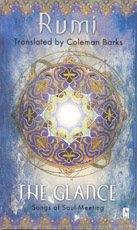"Rumi's poetry came out of the great friendship of Rumi and Shams. There are several versions of their initial meeting in 1244. One is simply that they glanced at each other. Another, that they talked about Muhammad and Bayezid Bistami. The one I love involves a drowning of books. Rumi is sitting by a fountain in a small square in Konya reading to students from his father's dazzling spiritual diary, the Maarif. Shams breaks through the group and throws the invaluable text, along with other books on the pool's edge, into the water. 'Who are you and what are you doing?' asks Rumi.
"It is time for you to live what you've been reading,' replies Shams. Rumi turns to the books in the water. 'We can retrieve them, if that's what you want,' Shams says. 'They will be perfectly dry, just as they were.'
"Shams lifts one out to show him. Dry.
" 'Let them stay,' Rumi responded.
"We probably cannot imagine what that relinquishing meant in the thirteenth century. A book must have felt like such a rare, complex entity, as subtle and labyrinthine as a town. To give them up would have been a deep surrendering.
"So began a friendship that became a way. Perhaps there is a necessary break between text and sacred experience. To go deeper, Rumi had to abandon his books. Rumi keeps saying this in almost every poem: words are not it. Language is not living. Rumi and Shams went off into months-long periods of sohbet, the twin-nova conversational dance that has such tremendous creative energy. A kind of force field of crackling vitality. We don't perhaps have a parallel in the West: Don Quixote and Sancho Panza, Jesus and Mary Magdalene, Faust and Mephistopheles, Lear and Cordelia, Suttree and Harrogate, each pairing has its own quality, but with Rumi and Shams the spiritual stakes are raised considerably."
See our map for A Celebration of Rumi
